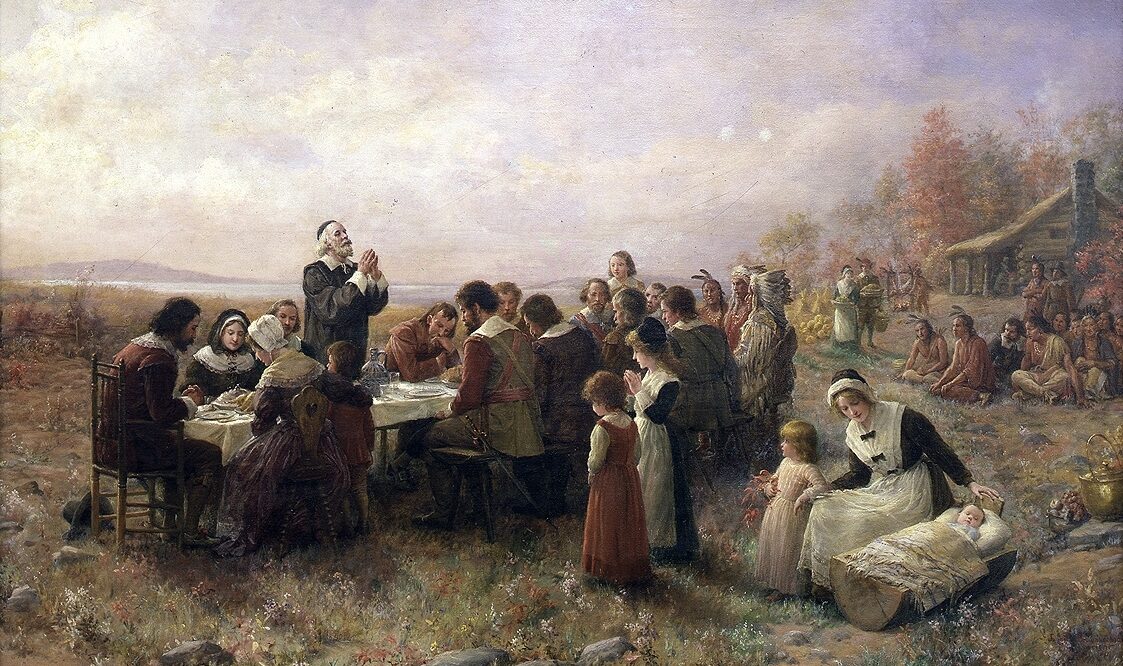Separation of Church and State Is Fake—Happy Thanksgiving!
Mike Johnson is right.

Mike Johnson is only a few weeks into his new job and already blundering. The Louisiana Baptist was caught Tuesday butchering the sacred cow of the “separation of church and state,” calling it a “misnomer” used to mean precisely the opposite of its original use. Johnson says the phrase, from a letter by Thomas Jefferson, was not actually intended as a blank check to bar Christianity from the public square, but as a warning against the tendency of magistrates to crowd out the sacred and the divine. Shocking!
To hear the Speaker of the U.S. House not only affirm the essentially Christian nature of American politics, but also remind the general public that the threat from the state to the church is the greater one than vice versa, is sweet indeed. It almost gives one hope that here, among the desacralized relics of a once-Christian nation, might be enough fragments to rebuild.
It’s a good time to think about rebuilding. Next week, for reasons too many of us don’t understand, we will bring out one of those old relics and set it at the center of our metaphorical tables. We will lift our hands in praise to the God who brought us to this fruitful land, say thanks, and feast. You and I will do it remembering our Christian ancestors, who endured great suffering and, but for the grace of God, would have perished in their first months on this side of the Atlantic. We will remember too, as they remembered, an even earlier band of pilgrims arriving in a land flowing with milk and honey, after much tribulation; we will worship God for the bounty which comes from only His hands.
We are the minority, as our neighbors remind us almost daily. Most will perform this ceremony of thanksgiving and feasting, but they will not understand anything of what they do. They will feast without knowing what they celebrate, or they will feast despite it, excusing its un-Enlightened purpose in order to fill their stomachs. Many will talk of gratitude, but few will admit to whom it is owed. Some will thank subsidiaries, as though tossing garlic at vampires, thanking their parents for cooking, categorically praising healthcare workers and immigrants (the priestly caste of today’s secular religion), and paying vague obeisance to Native Americans, without whom they are certain the Plymouth colony would not have survived. Perhaps they will even wish aloud that those same Native Americans had not been so helpful.
But it is our holiday they celebrate, and they still celebrate despite their ignorance, because these founding myths, even if they are really just myths as some say, are strong. The Pilgrim story is deeply woven into the fabric of our national identity, not simply because it is old, but because it is ours. Only a Christian nation could have made its first self-conscious act a feast day of thanksgiving to the God of their fathers. Only a still-Christian people, well over a century later, would have made that first feast day a state holiday. The act of thanksgiving is a distinctly Christian behavior, and the American people, despite great effort, have yet to complete their flight from this heritage. Even at this late hour, it calls out to us to remember, to return, to cry Holy! Holy! Holy!
The “separation of church and state” crowd would dearly like to forget this. That this Christian holiday (not the only one, we might note) holds such sway over our national conscience is bitter gall to the enlightened, to whom God is dead, or meaningless, or racist. Even those with far fewer philosophical inclinations have begun to feel icky about Thanksgiving: They don’t mind God, but they do mind his people, and that people’s continued adherence to a several-thousand year old Word. Why can’t we just celebrate turkey, or friendship, or gratitude for gratitude’s sake?
Subscribe Today
Get daily emails in your inbox
We could, but it would not work. Those who have tried to cut off the purpose of such holidays to make them better fit a modern aesthetic have found the holidays themselves quickly losing their former appeal. As only a small indication of this, Generation Z is apparently rejecting the millennial trend of neutral Christmas decor, in favor of the multi-colored, multidimensional warmth that has always marked that high day in our cultural memory. Our hearts were made to worship real things. They will not be satisfied with a sad, beige ritual of saying thanks to no one in particular for nothing especially.
This is what Johnson is getting at when he says that the “principles of faith” ought to have “influence on our public life.” Gratitude is good, and deserving of at least one day’s focus each year, but such gratitude will certainly evaporate without the Christian mooring which gives it meaning. There is no Thanksgiving without Christ. There is no liberty without the Author of liberty.
It is a worn truth worth repeating: Our American nation was founded by and for a religious people, even precisely a Christian people. Such will be true even when we have long forgotten what these relics once meant.